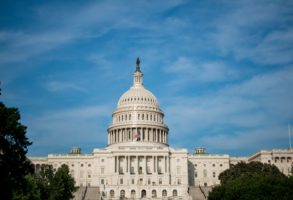Patrick T. Brown
Fellow
Patrick T. Brown is a fellow at the Ethics and Public Policy Center, where his work with the Life and Family Initiative focuses on developing a robust pro-family economic agenda and supporting families as the cornerstone of a healthy and flourishing society.
Patrick T. Brown is a fellow at the Ethics and Public Policy Center, where his work focuses on developing a robust pro-family economic agenda and supporting families as the cornerstone of a healthy and flourishing society.
His writing has been published in The New York Times, National Review, Politico, The Washington Post, and USA Today, and he has spoken on college campuses and Capitol Hill on topics from welfare reform to child-care and education policy.
He has published reports on paid leave and family policy with the Institute for Family Studies, and edited an essay series featuring working-class voices for American Compass. He is an advisory board member of Humanity Forward and the Center on Child and Family Policy and a contributing editor to Public Discourse.
Prior to joining EPPC, Patrick served as a senior policy advisor to Congress’ Joint Economic Committee. There, he helped lead research about how to make it more affordable to raise a family and more effectively invest in youth and young adults. He also previously worked a government-relations staffer for Catholic Charities USA.
Patrick graduated from the University of Notre Dame with a degree in political science and economics. He also holds a Master’s in Public Affairs from Princeton University’s Woodrow Wilson School of Public and International Affairs. He and his wife Jessica have four young children and live in Columbia, S.C.
Opinion: Americans deserve more than a Biden-Trump rematch
Patrick T. Brown

The last thing Americans need is a Biden-Trump rematch, and everybody knows it. Except them.
Articles
CNN / February 9, 2023
Why the Super Bowl Is Good for America
Patrick T. Brown

Don the jersey, embrace the pageantry, and invite friends over for seven-layer dip.
Articles
Public Discourse / February 8, 2023
Perspective: Conservatism’s post-Roe dilemma
Patrick T. Brown

Republicans who want the government to spend less are in conflict with those lobbying for more assistance for pregnant women and their babies.
Articles
Desert News / February 3, 2023
Opinion: The rare bipartisan opportunity House Republicans should take advantage of
Patrick T. Brown

Republicans should be using every advantage they can get in the House, and a bipartisan issue is one not to pass up. This is especially true with the opportunity to scrutinize the Biden administration.
Articles
CNN / January 28, 2023
Making It Easier to Have a Child Doesn’t Require Making Birth Free
Patrick T. Brown

We can and should expand safety-net programs around birth, but for middle- and upper-class families, ensuring predictability, rather than eliminating all out-of-pocket costs, might be a better goal.
Articles
Institute for Family Studies / January 23, 2023
How the GOP Can Make Childbirth Affordable Without Breaking the Bank
Patrick T. Brown

A truly pro-life party should better address the financial strains new parents face.
Articles
The Dispatch / January 23, 2023
The Case for Child Care at Work
Patrick T. Brown

Companies competing for workers can stand out by being family friendly and offering benefits tailored for parents.
Articles
Deseret News / January 16, 2023
The realization about the IRS that the GOP needs to have
Patrick T. Brown

A Republican Party friendly to the working-class shouldn’t reflexively oppose more frequent audits of high-income individuals on limited government grounds.
Articles
CNN / January 13, 2023
The truth some Republicans don’t want to hear
Patrick T. Brown

Avoiding at least one self-inflicted wound may be the best parting gift Republicans could ask for from an era of unified Democratic control.
Articles
CNN / December 22, 2022
Child Tax Credit Can Help With a Pro-Growth Policy
Patrick T. Brown

Republicans should want to deliver for their coalition.
Articles
The Washington Post / December 21, 2022
Bolstering Social Capital Through Better Workplace Policies
Patrick T. Brown

While public policy can strengthen social capital, employers can also play a substantial, voluntary role in strengthening the associations and institutions which can create a better environment for stronger families and communities.
Articles
The Social Capital Campaign / December 15, 2022
Why Kevin McCarthy may have the hardest job on Capitol Hill
Patrick T. Brown

Fights over legislative committee assignments and empty culture war gestures may suck up political oxygen, but they don’t point the way forward to a more compelling argument for Republican control of Congress.
Articles
CNN / December 1, 2022
The 1918 influenza outbreak left millions dead in its wake and impacted daily life in ways similar to our own recent coronavirus pandemic. But in popular culture, it vanished largely without a trace nearly as soon it was over. Americans were ready to turn the page on war and pestilence and let loose in the roaring '20s.
One senses a similar dynamic today. With the pandemic almost officially behind us, January 6 a fading memory and the economy beginning to return to normal, many Americans appear ready for a politics that focuses on new challenges rather than rehashing old battles over mask mandates and election integrity.
At its best, President Joe Biden's State of the Union speech offered that forward-looking vision, highlighting his administration's commitment to rebuilding America's supply chain and spurring innovation. But no amount of rhetoric could disguise the fact that our political system could be on a collision course to offer up the rematch no one is asking for.
It's still early. But a 2024 presidential election that features another slugfest between two elderly leaders rather than a scrappy fight between up-and-coming politicians with energy and enthusiasm would be doing the nation a disservice.
New polling suggests a growing desire for new faces. 58% of Democratic and Democratic-leaning registered voters told a Washington Post/ABC News poll they hoped their party nominates someone other than Biden in 2024. According to the poll, 49% of Republican and Republican-leaning voters said the same thing about former President Donald Trump.
The dynamics in each party are slightly different -- Democrats are restive but appear to lack anyone in the wings capable of mounting a compelling primary challenge. A new Associated Press-NORC poll found the share of Democrats who want Biden to seek a second term had fallen from 52% last year to 37% now (the poll was fielded before the State of the Union.) Younger Democrats, especially, hunger for a new face -- just under one-quarter of those age 18-44 hope Biden would run again.
On the Republican side, some party loyalists have a contender in mind. While Trump benefits from a dedicated base of support and, so far, being the only official candidate in the race, his victory is far from certain. Florida Gov. Ron DeSantis, who, at 44, is closer in age to the former President's oldest children, has revved up the GOP base with a series of policy wins and culture war battles.
Republicans who want to take the battle to "woke" institutions and push back against the left's excesses know that the DeSantis model can produce results at the state level.
Other potential challengers, like former US Ambassador to the United Nations Nikki Haley, face an uncertain path to the nomination but also offer a generational shift and a different set of priorities. And many party operatives will admit that a Trump campaign that looks backward -- at the indignities of the pandemic or his false claims about the 2020 election -- will risk coming across as detached from the challenges facing working-class Americans.
Both parties face the temptation of playing it safe. Democrats may be tempted to bank on Biden's ability to speak to working-class Americans to pull out a repeat victory over his predecessor. And Republicans can see polls like the one from the Washington Post and ABC News that suggest that if the election was held today, Trump would likely start with an edge over Biden.
And even if a younger candidate tried to push aside a more seasoned candidate, an explicit age-based argument can backfire. Just ask former Secretary of Housing and Urban Development Julián Castro, who learned the hard way that attack lines that seem to focus on an older candidate's memory or hearing do not play well. Any politician trying to campaign against a more senior opponent would have to be careful about not sounding dismissive toward older Americans' ability to contribute -- after all, senior citizens are reliable voters.
But the fact remains -- the incumbent President and his presidential predecessor were alive for the creation of NATO, the founding of the People's Republic of China and the state of Israel, the first color TV broadcast and other events that all but approximately 5% of Americans only know of from history books.
There is a wisdom in age and valuable perspective in having seen the long sweep of history. But both the President and the former President should have the foresight to recognize the desire for a change is not ageism, but a recognition of the demands of the job and the need for new voices and ideas.
Both Trump and Biden fulfilled their stated primary objectives as President --Trump, to draw attention to the plight of the "forgotten men and women of our country" and to raise questions about the logic of globalization that turned a blind eye to the rise of China, and Biden, to seek a return to something closer to normalcy after the four chaotic years that preceded him.
But the latent dissatisfaction with either option suggests political rewards for the party willing to take the gamble on a younger nominee. The 2020 primary election for Democrats was singularly focused on choosing the best candidate who could beat Trump. Perhaps Biden may still be the right man for the job. But a presidential debate stage featuring a younger, more energetic politician focused on issues of the moment would draw a stark contrast with one whose habits were formed during the Cold War.
Whether that's a younger Democratic nominee more effectively tapping into discontent over the Dobbs decision's impact on abortion rights, or a Republican candidate speaking, as a parent of young children, about the need to better protect kids online, a passing of the generational torch will allow for a much-needed shift of focus to fresh challenges.
Patrick T. Brown is a fellow at the Ethics and Public Policy Center, where his work with the Life and Family Initiative focuses on developing a robust pro-family economic agenda and supporting families as the cornerstone of a healthy and flourishing society.